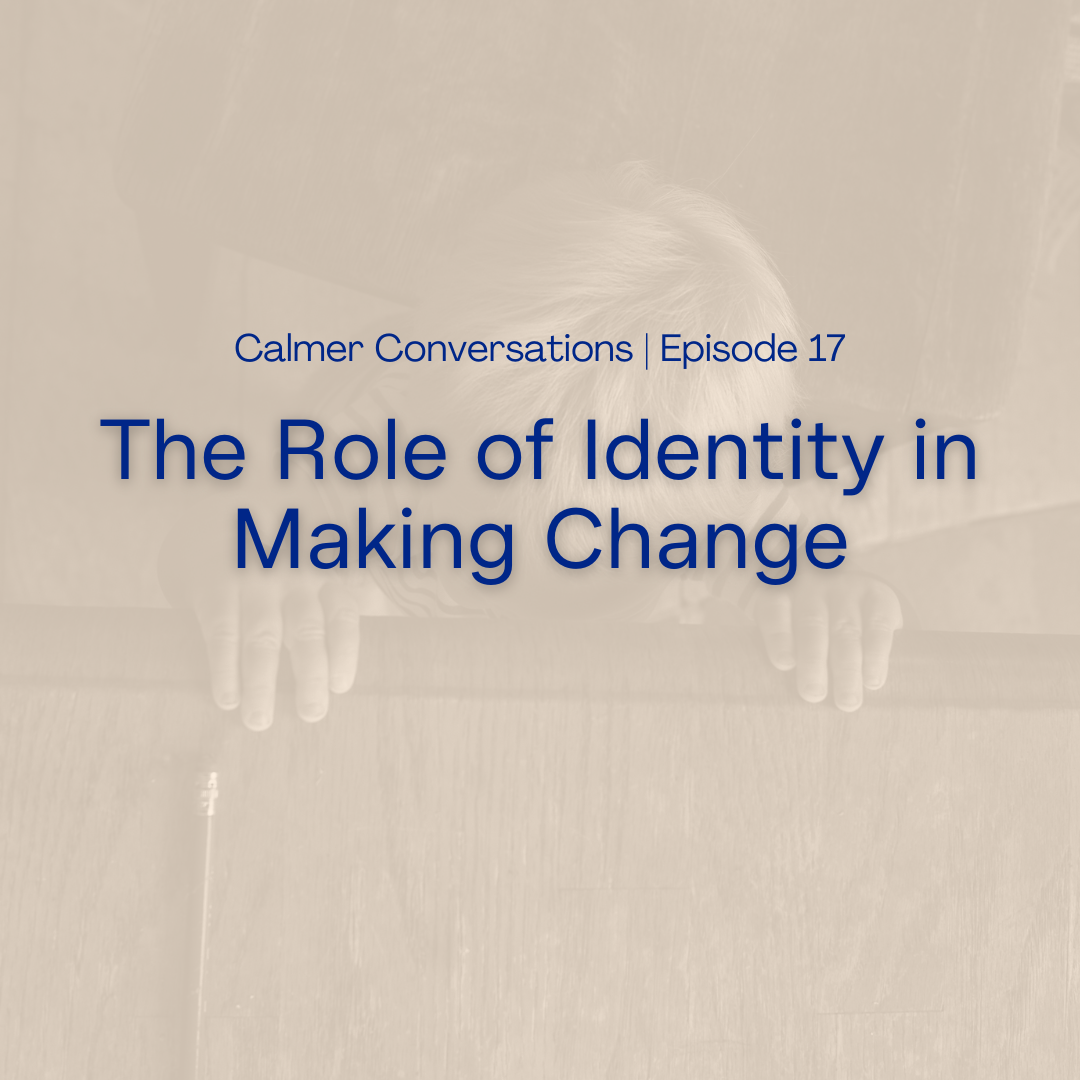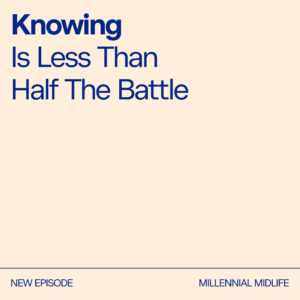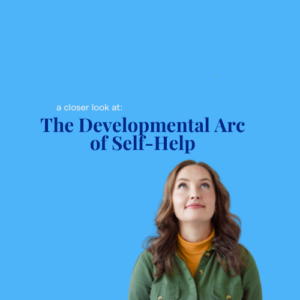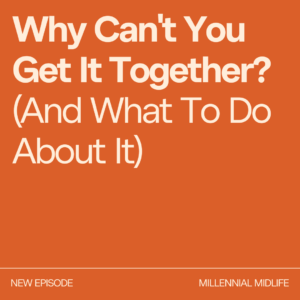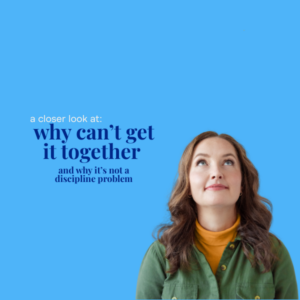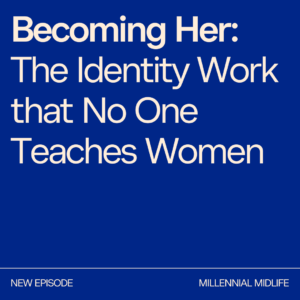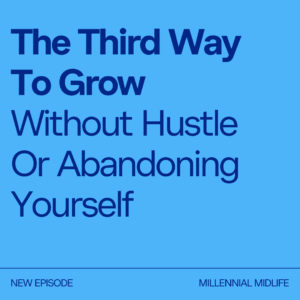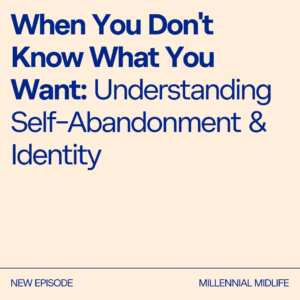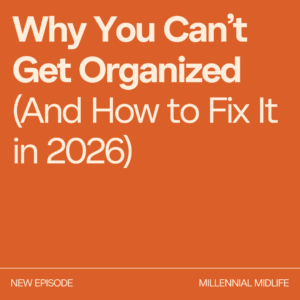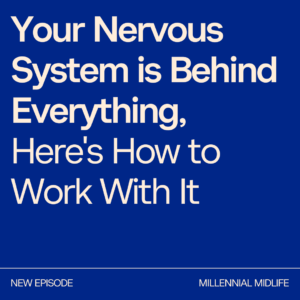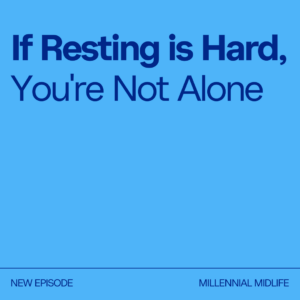Cecelia Baum Mandryk (00:01.474)
Hey and welcome to Calmer Conversations, episode 18. I am Cecilia, your host, and today I wanna talk about the rule of identity, and specifically past identity and future identity, in creating change in your life. And that change could be something that feels relatively small, like I wanna feel calmer, even though I would argue that’s probably a big change, or it could be something really major, like I wanna change careers or I wanna make a big move or.
do something else really drastic in my life. So no matter where you are in that space, you’re probably listening because you wanna feel differently in your life on some level. And so this, what I’m gonna talk about today can be applicable across the board. So don’t think that you need to be, have major identity shifts on your radar or changes in your life for this to be applicable for you. So if that sounds good to you.
Let’s get started. Again, the role of identity and changing. So one of the things your brain probably does, most likely does because you’re a human, is it predicts who you’re going to be based on who you have been. So it uses information from the past and other people’s interpretation of your personality for how you’re going to be in the future. And
This is a really interesting thing that it does. Part of it is if you listen to the episode where we talked a little bit about the motivational triad conserving energy, this is part of your brain that wants to conserve energy. And so it’s easier to assume things will continue how they have been instead of them changing all the time because it makes it easier for your brain to filter information and to predict what’s going to happen. So your brain thinks you will continue to be who you are.
that same part of your brain also really wants you to kind of maintain who you have been into the future because you’ve survived, right? So even if who you have been, let’s say you experience a lot of overwhelm or anxiety or anger, or you feel like you procrastinate a lot and that’s who you quote unquote have been.
Cecelia Baum Mandryk (02:20.098)
your this part of your brain wants you to continue that because even though it feels uncomfortable to you, you’re still alive right now. And this part of your brain is concerned with the conserving energy, but also with keeping you alive. So it’s not interested in you thriving, it’s not interested in you living your best life and being your fullest self and shining your brightest, or even just enjoying life. It is interested in you.
staying alive so that you can reproduce, that you can contribute to your tribe, et cetera. And so there is, knowing as we go into this episode, that there’s a big part of your brain that wants you to stay the same is really powerful. And if you want to change, right, let’s say, and I use the example of exercise a lot, if you want to become somebody who moves your body, if you want to become somebody who journals, if you want to become someone who feels calmer or is more present, you’re
you’re changing, you’re making changes within yourself, and so you’re living into a different version of you. And in order to get to that new version of you, we have to do a couple things. And the brain-based approach to doing this, the way of working with your how your brain functions and how your nervous system functions is what we’re kind of going to dive into a little bit more. And this will be a little bit of like you can play along here if you have a journal or if you have some way of
of writing down the steps or you you can look at the transcript you can get them and you can kind of work through this yourself. And this is if you’ve tapped into like the manifestation side of things or universal laws or even like some coaching people talk about like your future self which never really made a lot of sense to me but this is using that concept a little bit in what at least for me and for my clients has been a pretty practical way of.
of using it in our lives. Okay, you are, you’re, okay, let me back up just a little bit. Your brain is in a lot of habits. Your brain is a creature of habit. Your brain likes to conserve energy and so almost everything it does is on autopilot and in habit mode and that’s totally fine and normal. We just wanna recognize when that’s happening. So.
Cecelia Baum Mandryk (04:37.414)
Your brain has a lot of habits. What we do as humans is we take these habits and we make them mean something about us. So for instance, your brain might be in the habit of acting in a perfectionist way. Your brain might be in the habit of procrastinating to keep you safe. Your brain might be in the habit of worrying, of experiencing anxiety.
And usually what we do as people is we take these habits and we interpret them. And other people do this for us too, right? They tell us, you’re just this kind of person. We make it mean something about us. So we take these comments, we take these habits and we turn them into personality traits.
which means that it’s something inherent about you, something that’s unchangeable about you, something that will continue on for the entirety of this lifetime, right? And if you want to live into a new version of yourself, you have to kind of divorce yourself from these being traits. And so the first thing that…
you want to do if you want to feel differently in life or you want to change your identity in some smaller big way is recognize what is the story you tell you about you right now. So you can pause this or you can come back to this later but take the time to kind of write it out or speak it out to yourself or record yourself in whatever way is helpful for you but I would encourage you to either do it out loud or to write it down instead of just thinking it through.
I will fully admit that I tend to be like, I’ll just think it through, but it’s really not as powerful for your brain as writing it down or getting out of yourself if you don’t like writing to speak it out for yourself. recognizing this is how I talk to me about me. This is the story I have about me. If I needed to define myself to someone else or explain my personality traits, this is what I would say. This is a really powerful exercise because it tells you
Cecelia Baum Mandryk (06:53.8)
your beliefs about you and the things that you are probably inadvertently perpetuating in your life. So for instance, if you think I’m just a wound up person or I’m just an anxious person or I’m just an angry person, it’s a belief you have about you. It’s a quote unquote truth that you’re carrying around about you. You think it’s a personality trait. And sometimes we absorb them from other people, right? There was a client who the women in her family
have trouble sleeping. And so she just assumed that she would have trouble sleeping. And she never really questioned this. This was just like a story she had. It’s trouble for women in my family to sleep. I’m just never gonna be a great sleeper. Right? And this was a personality trait that she had. And yet she brought this to coaching. She wanted to work with it. She wanted to shift it and change it. And one of the first things we had to do was recognize the story. Right? Recognize that you were telling yourself the story you’re telling you about you. As I mentioned in other episodes, it’s
This story is not true, right? This story is not a truth about your inherent being. It might be a way, a habit that your brain has been in. It might be a way that you have been acting. For all you know, it might’ve been something that you did when you were a kid on one day. Somebody made a comment and then you took that comment on and kind of lived into that person, right? So you might’ve been told, you were an anxious kid and then you just became an anxious adult.
And again, with some of these things like anxiety, there is a brain chemistry component and we’re not talking about that. We’re talking about the thought side of this. We’re never gonna argue with the brain chemistry. That is exactly why medicine is so powerful for so many people. we’re talking about the other side of it, which is this side that you can impact and that you can shift and change. And that side is the side that says, I hear…
that I have been in this habit of worrying or I have been in this habit of being quote unquote tightly wound or being type A or procrastinating. This is a story I’ve been telling about myself. Once you notice, once you kind of write this down, you might ask yourself, how open am I to letting the story go or shifting and changing the story? And I think this is always a really important check-in because sometimes we’re not quite ready to let it go.
Cecelia Baum Mandryk (09:14.26)
Sometimes we are, we’re more than ready. Maybe that’s why you’re here, or you’re working with me in some capacity. And so you’re ready to let it go, but sometimes you’re not. And sometimes it’s okay to just say, okay, this is the story that I’m working with. This is what I’m telling myself about me. I’m not ready to change it, but I can be in the awareness that this is the story I’m telling, and I can be in the space of accepting it and noticing how it’s impacting me.
So I can start to notice, okay, when I do tell myself that I’m an anxious person or that I’m just a procrastinator, I can start to notice how I feel and how that impacts what I do in my life. So you can start to be in that awareness acceptance kind of pathway for you. But then when you’re ready, because at some point you will be ready to shift and change, you wanna ask yourself, where am I going? Who am I living into?
What is the next version of me? And if I could let those stories go, if those weren’t truths about me, like immutable truths that I cannot change, what would I want to be true about me today? What truth would I want to live into? What story would I want to start to tell myself? And once you’re able to let go, which this can be,
I’m saying let go like it’s this really simple process, which it can be very simple. Sometimes you need to come to something like coaching or work with some other professional to kind of let that story go or understand that story. But once you’re ready to let it go and you do let it go through whatever means you choose, then starting to decide who am I becoming? Where am I going? And then you can start. this is before we were.
We’re living from our past view of ourself and bringing that past into the future, right? So for instance, if you have been a procrastinator, if you have been somebody who uses procrastination to just to stay safe in the past, you might identify as a procrastinator. And by very, the very identifying as a procrastinator, you are continuing to bring it into your to your present day. So you’re taking it, you’re taking it from like,
Cecelia Baum Mandryk (11:30.87)
this is who I was, right, or this is how I have been behaving, then by claiming it as your identity, you’re bringing it into your present moment and then carrying it into your future. What we’re doing is we’re saying, okay, this is how I have been defining myself. I’m ready to let that go. But now I’m gonna ask, who do I want to become in the future?
and how can I start to bring that future into the present? So instead of bringing the past into the present and assuming I’m going to continue to behave as I have been behaving, or that even other people are gonna continue to behave as they have been behaving or anything around you, could I let that go? Could I start to see something different? And again, this is using your reticular activating system, it’s using different parts of your brain to bring in, to ask your brain to see something differently.
And this is can feel a little delusional at first and it can feel a little weird, but you’re just using the same mechanism in terms of like bringing your past into your present or bringing your future into your present. But one of them probably feels a lot better, right? So like if you’re bringing your future into your present, then this is you’re intentionally choosing this is who I want to be. This is how I want to show up in the world. So
Really in the same way that you wrote out the story you’re telling about you now What you might do is you might write out the story of who you’re living into Right and this could include any kind of things right? I’m somebody who easily maintains a healthy weight. I’m somebody who regularly moves my body I’m somebody who is calm or unflappable when a lot of things are going on around them. I’m somebody who
is patient when people around me are angry or when big things are happening. I’m somebody who brings in lots of money or is really successful in business, right? So dream up, connect with yourself. And instead of picking the thing where you think you should be, who you think you should be, you might ask yourself, who do I want to be? If I’m thinking about the next future version of myself,
Cecelia Baum Mandryk (13:38.572)
Who is that? And I will tell you one of the reasons, one of the things that prompted this episode was somebody in one of my coaching spaces was talking about aging and they were really thinking about who they had been in a positive light too, because honestly that story that you were telling about yourself can be really positive too. You still might want to let things go, right? So you still might, even though they’re like quote unquote positive things, you might just say like that is looking at who you have been.
Versus saying, okay, right now, in this present moment, I have a choice on who I am becoming. But when I, in order to have that choice on who I’m becoming, what I have to do is let go of who I have been. And to let go of who I have been, I have to let go of the story that is keeping that who I have been in place or the loss of who I was, but perhaps am no longer.
But then when I’m here in the present moment and I’m asking myself, who do I want to be going forward? All of sudden we have a lot of options, right? If you let go of the how you have been defining yourself, of the stories that you think you need to continue telling you, and you move into asking, who do I want to be? The world is your oyster, so to say, right? Like you get to kind of pick who you want to be. There are all these really fun stories about people.
you know, joining the Peace Corps when they’re 70 or starting to make violins when they’re 80 or, you know, getting PhDs when they’re in their 70s or 60s. So you don’t need to do anything like that. It could just be, want to feel calmer. But in order to live into being the calmer version of yourself, you have to let go of the version of you that was perhaps feeling overwhelmed or felt like a hot mess or whatever, however you were defining yourself then.
So then once you’re in this present moment and you’ve let go of this story consciously, and this is again a practice, so you’re usually continually letting go of the story as it comes back up, because this is a paved neural pathway in your brain. It’s a way your brain is conserving energy. And you ask about where I’m going. You can start to connect with that version of yourself, this future version. And you can start to ask, okay, if I did define myself as someone who felt calm, what would I do in this moment?
Cecelia Baum Mandryk (15:57.216)
What kind of advice do I have from that version of myself and how can I bring that into the current moment? So for instance, if I were someone who moved their body every day, what would I do? Well, I might go for a five minute walk right now. I might start to define myself in that way. And then that definition, instead of keeping me, pulling me back to my past version, it’s kind of pulling me forward into my future version of myself. And there’s this element, and I said this before, but
being a little bit delusional, but you do have to be a little bit delusional and letting go as you step into where you’re going and who you’re becoming. So there is this part where you have to say, okay, I’m not gonna do the thing that I’ve been trained to do, which is define myself by who I have been in the past. I’m gonna let that go. I’m gonna say that who I have been doesn’t define who I am becoming.
And instead, I’m going to live in possibility in this moment and say that there are other ways of being that are possible. And in fact, when I stop defining myself by who I have been and the habits I have been in, suddenly this is available to me and I can start to change the story I tell. And I want to be conscious of making this sound. It is simple. It’s not everything I share. I aim for it to be sort of simple and applicable.
But I do recognize that changing your identity can be really challenging for a lot of people, right? So if you have an identity of somebody who doesn’t ask for help, all of a sudden, if you want to live into somebody who accepts support and has a lot of support in their life, that can feel really challenging. And so again, this is why having a coach, and I think coaching is particularly good at this over something like therapy, because often coaching is asking who are you living into?
If you were thriving, if you were moving forward, who would you be? What would you be doing? So using this approach where you’re working with your brain and working with your nervous system to consciously let go of who you have been and intentionally step into who you want to be is a powerful process. It can take a little bit of time and a little bit of undoing, but it is entirely possible and it’s a lot easier than you think it is. And it can even be really fun.
Cecelia Baum Mandryk (18:20.362)
as I try and bring in here, it doesn’t have to be a super serious process and it doesn’t have to be this process that feels really hard and arduous, it can be really joyful and there can be a lot of forgiveness and there can be lot of compassion and grace for the old versions of you and for the version of you that felt like they needed to pull that past you into the present. And then it can be a lot of fun to intentionally design who you are becoming. And really truly when you let go of this is who,
this is who I am, that’s really solid. And you say, but who do I want to be? Suddenly, again, you get to it’s a playground really, it’s like a sandboxy kind of thing, right? Where you get to the sign, who you want to be and how you want to show up and what you want to do. And that is a really powerful place to be. So this is what it looks like to change who you are. And it can be, I mean, I feel like I’ve done this several times in my life. have
once said to somebody, I feel like I’ve lived several lifetimes and I was like, in this life, right? I feel like I’ve lived several lives within this life because once I figured out how to do this and can do this intentionally, you can start to let go of identities and assume identities as you want to and as you recognize what’s serving you and what’s not serving you. And really, truly, that is what creating a life that you love and that feels really great to you is about. It’s about recognizing the patterns and habits your brain is in.
Consciously letting go of the ones that aren’t serving you and intentionally stepping into the ones that you think might serve you more Playing with those for a while noticing if they do actually serve you and if they do moving forward with them And if they don’t then dropping them and changing to something else Okay, so that’s the role so if you I guess to kind of sum up a little bit if you You have to be able Looking at your identity is a crucial piece or looking at your
how you currently define yourself is a critical piece of moving forward with a new identity and feeling differently in life and doing something differently in life. So oftentimes we have to let go, we have to stop looking back and bringing that forward and we have to start looking forward and bringing that into the present moment. And for me, this has been the most effective way of using that kind of future self.
Cecelia Baum Mandryk (20:42.988)
And I’ll just say with your future self or with this new version, you can have conversations with them too and ask them how they would be showing up or what they would be doing or what they are interested in or all those different things. So that maybe is even a different episode, but just knowing that your brain is in habits and the habits that your brain is in are not necessarily personality traits that you have. They’re states that you’re in right now. And once you’re willing to let go of those states or you’re willing to loosen your grip on them, suddenly all kinds of change is possible.
And again, if you want support going through this, if you want to be in a space where you can talk through this with other people, you can watch other people go through the exact same process too, then come join the club. Try it out. See what coaching can bring into your life from this shifting place, from becoming who you want to be in the world. All right. Thanks so much for joining today. As always, it was a pleasure and I will see you next time.

